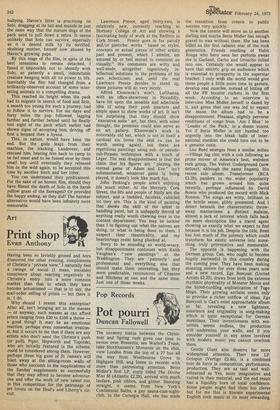Pop Records
Pot pourri
Duncan Fallowell
The uncanny hiatus between the Christmas and Spring rush gives one time to swoon over Rossettis, see Warhol's Trash, take Stockhausen's Momente on the chin, view London from the top of a 27 bus all the way from Westbourne Grove to Highgate Hill, and listen to records with more than patronising attention. Bette Midler's first LP, coyly titled The Divine Miss M (Atlantic £2.29), arrived with much fanfare, pink ribbon, and glitter. Shooting straight, it seems, from New York's Continental Baths, a gay sauna-cum-nightclub, to the Carnegie Hall, she has made the transition from coterie to public success very quickly.
Now the coterie will move on to another darling and maybe Bette Midler has enough gravel to wax without them. She has been billed as the first cabaret star of the rock generation. Friends smelling of Habit Rouge who have seen her perform swear she is Garland, Garbo and Groucho rolled into one. Certainly she would appear to have that electric grip on audiences which is essential to prosperity in the superstar bracket. I only wish the world would give these people a little more time to gestate, develop real muscles, instead of letting off all the PR booster rockets in the first week. According to an interview in Interview Miss Midler herself is dazed by it, and given that one was led to expect the moon the album had to be a disappointment. Pleasant, slightly perverse renditions of songs from 'Am I Blue' to 'Leader of the Pack,' in a dozen voices. Yet if Bette Midler is not hustled too urgently into the bleak halls of international stardom she could turn out to be a genuine cutie.
Lou Reed emerges from a similar milieu —Village fag chic with a cult following as prime mover of America's best, weirdest rock group, The Velvet Underground (now defunct, although the name lingers). His recent solo album, Transformer (RCA £2.29), panders to the wider popularity .which has grown around him quite recently, perhaps influenced by David Bowie who produced the record with Mick Ronson. The songs are witty, brilliant in the brittle sense, glibly presented. And I detect beneath the characteristic throwaway mannerisms a distinct malaise, almost a lack of interest which falls back on mere description like a travel agent showing us exactly what we expect to find because it is his job. Despite the title, Reed has lost much of the potency which could transform his exotic universe into something truly provocative and memorable.
The opposite is happening with the German group, Can, who ought to become hugely successful in this country during the coming year. They have been making stunning noises for over three years now and a new record, Ege Bamyasi (United Artists £2.25), draws from both the extreme rhythmic physicality of Monster Movie and the blood-curdling sophistication of Togo Mago. Their growing acclaim seems only to provoke a richer outflow of ideas. Ege Bamyasi is Can's most approachable album so far, revealing a new lightness, assurance and originality in song-making which is quite exceptional for German musicians. Their inventiveness with son orities seems endless, the production will undermine your walls, and if you consider yourself in any sense involved with modern music you cannot overlook them.
Gentle Giant also deserve far more widespread attention. Their new LP, Octopus (Vertigo £2.40), is a combined tour de force in composition, performance, production. They are as taut and well rehearsed as Yes, more imaginative and varied in their material, and the end result has a liquidity born of total confidence.
Some people might find them too clever but for me this is literate experimental English rock music at its most rewarding.


































 Previous page
Previous page